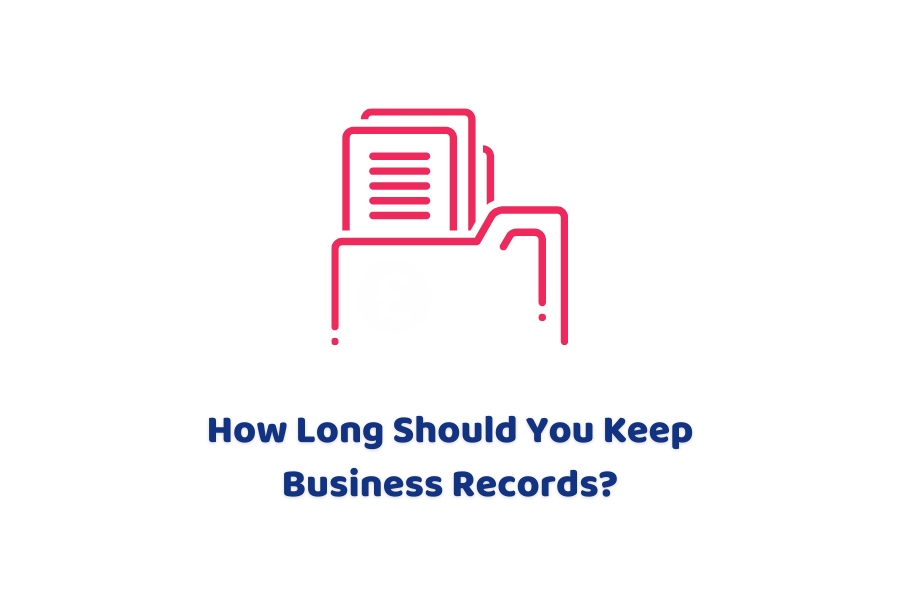Whether you are running a limited company or you are self-employed, you need to maintain a proper record. For whenever your business is under auditing or HMRC tax compliance checks, you have a record of all documents with you. So, keeping business records is beneficial when you are approached by HMRC to make your tax dues clear and ultimately up-to-date.
Maintaining and keeping bookkeeping records after a financial year ends is very cumbersome. However, if you save all your recordkeeping with you, you can save yourself and your business from many tax investigations and other assets and liabilities complexities when an audit starts. However, many businesses ask for a specified period for which HMRC can reach out to you.
In this accounting guide, we will walk you through what business records are important to keep for years and how long they should be maintained. Secondly, we will also discuss the reasons to maintain business records for years. So, let’s start our holistic guide on keeping business records!
What Business Records are Important To Keep?
You must keep the following business records to present whenever HMRC approaches you asking for business records. However, if you have no idea which documents are important to keep and which documents require no long-term possession, only then you can manage your records effectively and efficiently.
Are you looking for a bookkeeper who will offer customized services to your business? Reach out to them by selecting your own accountant at Accounting Firms.
Here is a list of documents if you have a limited company in the UK. Let’s have a look!
- Record of shareholders, company management, and Board of Directors
- Record of all resolutions and votes
- Record of all company debentures
- Record of all company’s indemnities, in case of any loss by the company
- All the transactions of buying shares
- Bookkeeping of all assets and liabilities of a company including debt and equities.
- Loan and Mortgages Documents
- Credit and Debit Card Statements
- Tax Returns Documents
- Record of all Ledgers
- Sales Documents
Moreover, if you’re self-employed in the UK, you need to keep the record of the following documents:
- Record of personal income
- Record of expenses
- Record of all sales and Revenue
- Record of VAT
- Record of PAYE
- Record of any grants received from the Self-Employment Income Support Scheme
How Long Should You Keep Business Records?
A major confusion arises on the time duration for which you need to hold on your business records. HMRC helps you in getting out of this quagmire by recommending the specific number of years for which they can approach you for tax compliance checks and other financial matters.
So, if your business falls into the category of a limited company, you need to hold on to your business and bookkeeping records for six years. As HMRC may ask you for clearing tax records and returns if you sent these payments late then six years is ideal for retaining business documents.
For self-employed people, the HM Revenue & Customs (HMRC) recommends document retention for at least five years. Mostly, storing documents for five years is helpful when HMRC asks you to present your tax returns if you have made payments lately.
HMRC and Tax Compliance Checks
If you are managing a business or you are self-employed, HMRC may require you to keep some documents for their tax compliance checks.
Tax Compliance Checks by HMRC ensure you are paying the right amount of tax. If this is not so, you have to pay an additional amount or you will be repaid an amount by HMRC.
If you have paid less tax, HMRC will require you to pay tax returns on time. On the other hand, you will be repaid from HMRC if you have paid more than the required taxes. For tax compliance checks, the HMRC will ask you to present the following documents:
- Record of all paid taxes
- PAYE Record
- Record of Company’s Tax Returns
- Self-Assessment Tax Returns
- Record of Tax Calculations
Conclusion
However, when maintaining a record, you need to understand which document is important to retain and which record is unnecessary to possess according to their purpose. As a result, you can maintain business bookkeeping smartly and efficiently. So, keeping business records for a specified period can help you in auditing and tax returns in several ways. A public limited company or a self-employed person may need to save different documents as per the requirements of their business.
Accounting firms help you hire a professional tax advisor meeting your business and budget requirements impeccably. Why wait when you can search your tax consultant with just a few clicks? Call us now!
Disclaimer: This article provides general commentary on, and analysis of, the subject addressed. We strongly advise that you consult an attorney or tax professional to receive legal or tax guidance tailored to your specific circumstances.

